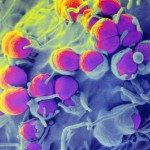Link to Pubmed [PMID] – 26366611
J. Am. Chem. Soc. 2015 Oct;137(39):12438-41
The identification of MUC1 tumor-associated Tn antigen (αGalpNAc1-O-Ser/Thr) has boosted the development of anticancer vaccines. Combining microarrays and saturation transfer difference NMR, we have characterized the fine-epitope mapping of a MUC1 chemical library (naked and Tn-glycosylated) toward two families of cancer-related monoclonal antibodies (anti-MUC1 and anti-Tn mAbs). Anti-MUC1 mAbs clone VU-3C6 and VU-11E2 recognize naked MUC1-derived peptides and bind GalNAc in a peptide-sequence-dependent manner. In contrast, anti-Tn mAbs clone 8D4 and 14D6 mostly recognize the GalNAc and do not bind naked MUC1-derived peptides. These anti-Tn mAbs show a clear preference for glycopeptides containing the Tn-Ser antigen rather than the Tn-Thr analogue, stressing the role of the underlying amino acid (serine or threonine) in the binding process. The reported strategy can be employed, in general, to unveil the key minimal structural features that modulate antigen-antibody recognition, with particular relevance for the development of Tn-MUC1-based anticancer vaccines.

